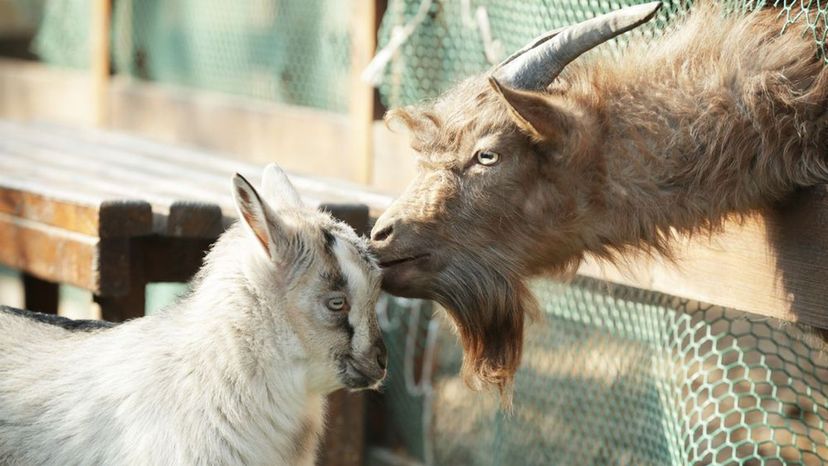
About This Quiz
Animals ... we love 'em! But there's a lot more to the animal kingdom than YouTube videos of doggies and kitties. Test your knowledge of zoology with our quiz!The Greek words in question are "zoion" and "logos." Of course, in English, it's easy to remember because of zoos, the places where we see animals.
Aristotle was a scientist when it was considered "natural philosophy." He classified animals and studied the ways that their form influenced how they functioned in the world.
Darwin is synonymous with evolution and the ongoing debate about evolution versus intelligent design. It's not as well known that Darwin studied to be an Anglican minister in his youth.
Advertisement
Humans used to be diurnal animals. Our invention of electric light and control over our environment has changed that a lot.
"Crepuscular" means "relating to twilight," and refers to animals most active at dusk. It's also a good word to keep in mind for Scrabble games.
The dodo bird and the passenger pigeon are well-known examples of extinct species. Currently, there is debate over "de-extinction," or using DNA to bring species back to life.
Advertisement
Spiders are part of a group called arachnids. They take their name from a Greek myth about Arachne, a girl so proud of her weaving skills that she challenged Athena to a contest -- and was turned into a spider when she lost.
These creatures -- feared for their ability to spread Lyme disease -- also have eight legs. They are hardest to spot in the spring, when they're in the small nymph stage.
"Nomeclature" is the general English word for how/why things are named what they are. But in science, the correct term is taxonomy.
Advertisement
Linnaeus was a Swedish botanist. People still refer to "Linnean taxonomy," though many changes have been made to his system since he proposed it in 1735.
Linnaeus's system had five kingdoms at the top. Today, it's six, with the kingdom of "monera" broken up into "eubacteria" and "archaebacteria."
The system you probably learned in school was: kingdom, phylum, class, order, family, genus, species. There are a number of mnemonic phrases out there that help students remember this.
Advertisement
There are three domains: Archaea, Bacteria and Eukarya. Everything in zoology, all the animals, fall under Eukarya.
Birds fascinate many people. Many who didn't pursue a degree in ornithology are still out in the fields and bushes with spotting scopes, birdwatching.
Mammals are warm-blooded animals that nurse their young. "Theriology" is another name for "mammalogy," if you are looking for a fancier term.
Advertisement
Bats give birth to live young (not eggs) and nurse them. Their furred bodies -- instead of feathered -- led the Germans to name them "Fledermaus," or "flying mouse."
Mendel worked with pea plants, not animals. But his discoveries about genetics advanced the field of zoology as well.
The eohippus is now extinct. It was followed by the mesohippus, which was more recognizably like the horses we know today.
Advertisement
Don't be fooled by "protozoology," which is the study of protozoa. Amoebas, for example, fall under the umbrella of protozoology.
Jane Goodall is a famous primatologist. She did a 55-year study of chimpanzees in Tanzania, and founded the Nonhuman Rights Project.
Fossils can be plants or animals. The entirety of the fossils we have, including those yet undiscovered, is the "fossil record."
Advertisement
Early animal science dealt a lot with morphology. The ability to study animal cells or DNA had to wait for technology to develop.
No species on Earth has as much variation in height, weight, color and other characteristics as the canis familiaris, aka domestic dog. From the teacup Maltese to the Irish Wolfhound, humans have created a dog for every climate, job and lifestyle.
Unsurprisingly, this comes from the Greek word for fish, "ichthys." There's even a related word, ichthyophage, for a person or animal that eats primarily fish.
Advertisement
These include the big cats, like lions, down to the housecat, which is called "felis catus." (Sometimes it seems like zoologists really aren't putting in an effort when they make up these names!)
African elephants have bigger ears than Asian elephants do. There are only three species of elephant extant (still alive) today: two are African, the Loxodonta africana and the Loxodonta cyclotis, and one is Asian, the Elephas maximus.
An animal doesn't have to exclusively eat fruit. This just means it's a preferred and significant part of the diet. Some kinds of bats are frugivores.
Advertisement
Most kinds of cats are obligate carnivores, including housecats. People who put their cats on vegetarian feed will need to give them nutritional supplements to keep them healthy.
The cheetah might be able to achieve short bursts of speed of 70 miles per hour (though reports on this conflict). More commonly, when hunting, they run at about 40 mph.
We are most familiar with the terms "bull" and "cow" in domestic cattle. But the term is used with other species as well.
Advertisement
Humans are famously omnivorous. Our dogs, which adapted to living in our environments, are omnivorous too, though they still show a preference for meats.
Leave it to the swan to have an elegant name for its young. These creatures are well-known for their beauty -- but also for their bad temper.
If you got this one without the hint, admit it: Did you learn this word by watching the extremely cheesy 1954 movie, "Them!"? (We did!)
Advertisement
If you've ever volunteered at a wildlife rescue or animal shelter, you've probably been taught procedures to guard against zoonotic diseases. Step one: wash your hands. A lot.
Jane Goodall, Dian Fossey and Birute Galdikas are sometimes called "the Trimates," They are/were all ground-breaking female primatologists. For some reason, German-born Galdikas isn't as well-known as the other two.